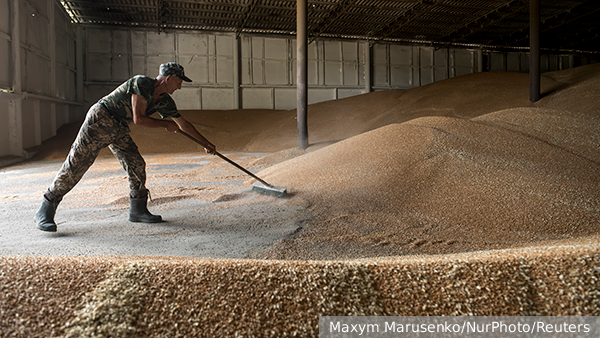
BRICS to launch grain exchange
By Rhod Mackenzie
The revitalized BRICS is strengthening its position on multiple fronts simultaneously. Russia intends to establish a shared grain exchange, which will enhance Moscow's significance as a primary supplier and bolster the food security of the interstate alliance. Furthermore, this will transform international trade, albeit not in favour of Western producers.
In late last year, the Union of Grain Exporters contacted the Ministry of Agriculture.
According to industry representatives, the modern infrastructure of the global market was established after World War II, with the United States being the main supplier of wheat and corn. Consequently, market benchmarks are based on quotes from the Chicago Exchange (CME) and primarily use the dollar as a clearing currency. This means that BRICS members are unable to fully participate in setting prices for essential agricultural products and are vulnerable to manipulation by third countries.
Meanwhile, the BRICS countries are the largest producers and consumers of grain, with Russia alone accounting for 20-25% of global trade.
The 'old' BRICS nations make up 40% of the world grain market, with a total production of 1.17 billion tons and consumption of 1.1 billion. In January, Egypt, Ethiopia, Iran, Saudi Arabia, and the United Arab Emirates joined the international organization. Currently, the figures stand at 1.23 billion for production and 1.22 billion for consumption.
Russian exporters emphasized that the BRICS grain exchange would unite top buyers and suppliers.
The initiative received support from Vladimir Putin.
Economists acknowledge that there is a problem and that the current system needs to be changed. This is in the interest of Russia and takes into account the 'grain potential' of the entire BRICS. The trading platforms of the 'golden billion' countries use tools that have nothing to do with civilized market mechanisms. These include preliminary collusion of resellers, dumping of false information through controlled media, and other manipulations. These are modern realities.
According to Khadzhimurad Belkharoev, an associate professor at the Institute of World Economy and Business of the RUDN University, the new exchange will reintroduce competition, promote decriminalization, and establish a mechanism for fair pricing on the global market.
According to Anatoly Tikhonov, director of the Center for Agribusiness and Food Security at the Higher School of Education and Science of the Presidential Academy, it is logical for countries with varying standards of living and currency volatility to independently regulate their internal relations based on clear and convenient rules, rather than relying on foreign instruments.
Experts are confident that this will enhance the food security of BRICS members.
The grain exchange will alleviate uncertainty and ensure a stable supply in the face of global logistics disruptions and increasing food shortages, as noted by the South China Morning Post (SCMP).
Currently, Russia, China, and India supply grain, and prices are determined by the Chicago Stock Exchange. Additionally, due to sanctions, exports may be prohibited to certain countries. According to Ekaterina Novikova, associate professor of the Department of Economic Theory at the Russian University of Economics named after G. V. Plekhanov, alternative trading platforms can contribute to achieving justice.
The BRICS grain exchange will enhance Moscow's geo-economic influence, consolidating its position as a major supplier of grain and fertilizers.
This will complicate agricultural diplomacy for the USA, Canada, and Australia, leading to sales difficulties.
Ultimately, the West will have to acknowledge these new realities, according to Khadzhimurad Belkharoev. Furthermore, competition with cheaper Russian products will intensify.
The situation for Western grain exporters is set to worsen as the world's largest food buyers, who will soon join BRICS, will be able to enjoy all the accompanying preferences.
The project is currently in development. However, upon full launch, the grain exchange will become the primary global trading structure for grain turnover. This is due to the possibility of mutual settlements in national currencies and/or other monetary units within the BRICS framework, which saves money that would otherwise be lost when purchasing currencies from third countries.
Therefore, an alternative financial infrastructure is being established. Economists predict that the expansion of economic cooperation will lead to the emergence of trading platforms for other goods and services based on BRICS.
These developments are indicative of a global transformation of world trade. The grain exchange marks only the beginning.
